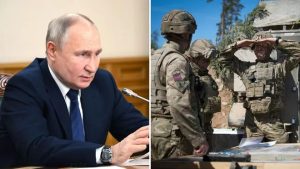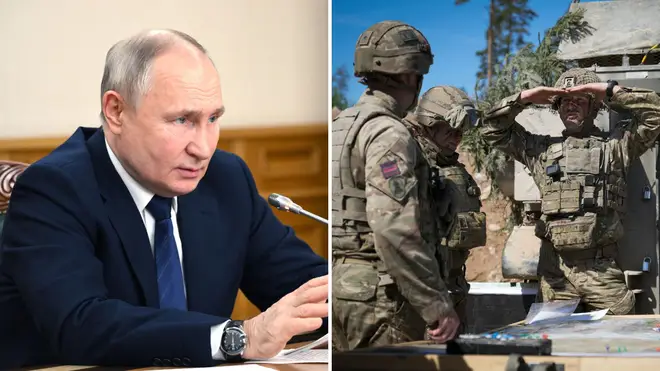
Vladimir Putin has warned the Baltic states they do not understand “what will follow” in a fresh threat to Britain’s Nato allies during a trip to Russia’s European enclave.
He visited Kaliningrad, a patch of land sandwiched between Poland and Lithuania that Russia controls, after flying in by skirting around Nato airspace in the Baltic.
He took aim at Estonia, Latvia and Lithuania for tearing down old Soviet war memorials – icons that many in those countries view as symbols of oppression.
“This is stunning ignorance and lack of understanding of where they live, what they are doing and what will follow,” he said during a visit to the Kant Baltic Federal University.
Putin, whose bloody and unprovoked has cost tens of thousands of his countrymen’s lives in a war that completely failed to subdue Kyiv, is seen as holding a view of a “Russian world” that his state should be allowed to dominate.
Estonia, Latvia and Lithuania were in the Russian and Soviet empires – immediately putting them at risk of irredentist claims in Russia.
Amid Kremlin lies about “Nazis” running Ukraine and some kind of vague perceived threat from the country, Western critics say Moscow wants to bring it back under its control through force and pressure.
It has already largely captured Belarus, thanks to the actions of its dictator Aleksandr Lukashenko.
It’s feared the Baltic region, including Kaliningrad, could be the flashpoint of a future Nato-Russia conflict if Putin was to attempt to test the alliance’s resolve to defend the countries.
They directly neighbour Russia and have so far only had token Nato “tripwire” forces from countries like the UK and France based there.
Putin may hope he can bring back Eastern European countries once dominated from Moscow back into their sphere of influence but would need to shatter Nato to achieve that.
However, his mouthpiece Dmitry Peskov said the visit was not a warning to the alliance.
“When the president visits the regions of the Russian Federation, it is not a message to Nato countries,” he said.
“The most important thing is not to send messages, but to do what he has been doing for many years – working on the development of our country and our regions.”
The Kremlin may be feeling emboldened in Ukraine after managing to halt the 2023 counteroffensive using deep minefields and entrenched positions.
Recent German defence ministry documents outlined a hypothetical scenario where Western support for Kyiv wanes and Russia captures it, leading to a confrontation with Nato.
And this week, the impact of such a conflict was made even worse as the British Army’s head General Sir Patrick Sanders warned a “citizen army” – maybe consisting of 500,000 people – would be needed to bolster the regular forces and beat Russia.
But as some feared future conscription, Rishi Sunak’s spokesperson said: “The British military has a proud tradition of being a voluntary force. There are no plans to change that.”
By Will Taylor@WillTaylor_news






